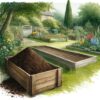Organic Gardening Primer
Organic gardening (OG) is a form of gardening that focuses on growing plants without using synthetic products such as chemical fertilizers, pesticides, or other artificial products. It is an environmentally friendly way to grow your own fruits, vegetables, herbs, and flowers without the use of chemical inputs. Organic gardening also helps to promote a healthier environment, as it relies on natural methods to keep plants healthy and strong.
Benefits of the Organic Garden
Growing organically is a great way to make sure that your produce is free from harmful chemicals, while also helping to protect the environment. When you choose to garden with this method, you are helping to conserve water, reduce pollution, and promote healthy soil. It also reduces the amount of energy used for production, as you don’t need to use chemical fertilizers or pesticides. Additionally, organic gardening reduces the amount of waste that is created from traditional gardening methods, as organic materials can be safely composted.
Organic Soil:Compost is the Key
In order to successfully garden organically, you need to create a soil environment that is conducive to plant growth. This can be achieved by adding organic matter such as compost and mulch to the soil, which will help to improve soil structure and increase nutrient availability. You can read more on composting here: How to start composting. Additionally, you need to select plants that are well-suited to your climate and soil type, as this will help ensure that your plants will thrive in their new environment.
No Pesticides or Roundup
OG also relies on natural pest and weed control methods. This includes using companion plants to repel pests and natural predators, as well as handpicking weeds and mulching to prevent weed growth. Additionally, you can use organic pesticides if necessary, but it is important to always read the label and use the product as directed.
Organic gardening is an excellent way to help protect the environment, while also growing nutritious produce for your family. It is important to note, however, that organic gardening does require more effort and knowledge than traditional gardening methods. The key to success is to do research on the specific plants that you are growing, as well as the climate and soil type of your area. Additionally, it is important to be patient and give your organic garden time to reach its full potential. With a bit of effort and dedication, you can reap the rewards of growing a healthy and sustainable organic garden.
More links below:










